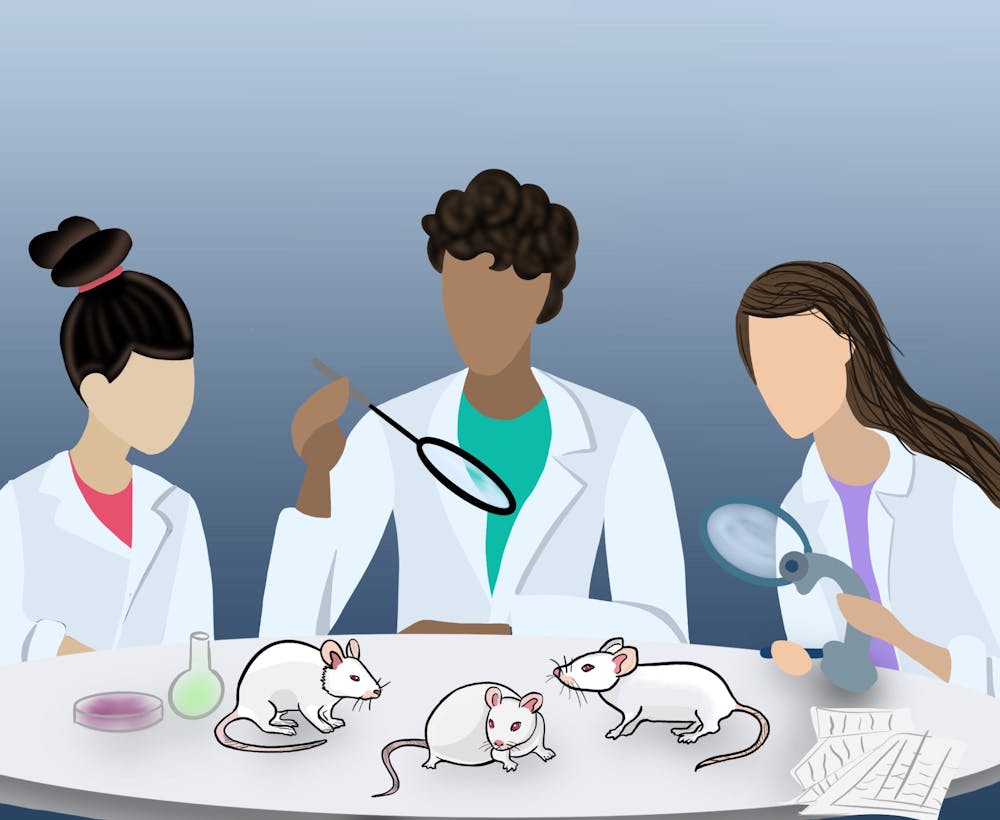In a Nov. 17 open letter, People for the Ethical Treatment of Animals called President Christina Paxson P’19 P’MD’20 to address “serious concerns about failing oversight in Brown’s animal experimentation program.” PETA cited 11 violations of federal animal welfare guidelines between July 2021 and May 2022, reported by the University.
Written by Andréa Kuchy, research associate at PETA’s laboratory investigations department, the open letter cited instances in which experiments in University labs have deviated from protocol set by the Institutional Animal Care and Use Committee. The IACUC, made up of faculty, veterinarians, staff and other community members, is responsible for the oversight of animal use in University laboratories, according to Brown’s website.
According to the open letter, there have been incidents of animals “used in unapproved procedures,” those who have “died or were euthanized due to starvation or dehydration” and animals that were left to “suffer beyond the established humane endpoints.”
Brown self-reports these offenses to the IACUC, which shows the University’s “commitment to the highest standards of animal welfare, as all incidents of noncompliance are taken very seriously,” Jill Pipher, vice president for research at the University, wrote in an email to The Herald.
Kuchy suggested that violation instances outlined by PETA’s letter, which include “the death of mice from starvation and dehydration, failure to provide animals with safe housing (and) failure to euthanize a mouse according to veterinary directives,” fall under IACUC jurisdiction. These concerns were previously highlighted in a July 2021 open letter written by PETA Vice President of Laboratory Investigations Cases Alka Chandna, The Herald previously reported.
The 2021 open letter cited 23 violations in Brown’s laboratories from March 2019 to April 2021, The Herald previously reported. According to Chandna, the decrease in violations from 2021 is not substantial.
“It appears that the disregard for animals and seeming contempt for federal animal welfare laws remains the same” at the University, Chandna wrote in an email to The Herald.
The University, which receives federal funding from the National Institutes of Health, is also required to self-report such laboratory practices in violation of animal welfare guidelines to the Office of Laboratory Animal Welfare in a timely fashion, Chandna wrote. The University received around $140 million in funds from the NIH in the 2022 fiscal year.
But the exact use of these funds is difficult to determine. According to Pipher, “without a complex analysis, it is challenging to give a precise answer about what portion of NIH-funded research includes some use of animals.”
Pipher wrote that the University also funds other research projects, including a project with the National Institute of Aging developing nursing home projects for dementia without the use of animals.
While not all University projects funded by the NIH involve animals, for those that do “it’s not in Brown University’s interest to be transparent regarding what happens to animals in its laboratories,” Chandna wrote.
As an agency that funds university research like Brown’s, “OLAW is not keen to publicize that institutions that receive millions of tax dollars from NIH are operating afoul of the law,” she added.
Benny Smith ’23, Brown Animal Rights Coalition executive leader, wrote in an email to The Herald that “researchers are required to be very open about the treatment of humans in any experiment they perform, and the same should be true of other animals.”
Smith added that acknowledgement of biases against certain species of animals in the University’s laboratories is important because, in practice, not all species tend to receive equal protection in laboratories.
“These violations are not published by Brown University or federal authorities. Instead it falls on watchdog groups like PETA to use the Freedom of Information Act to secure this information — and to share the information,” Chandna wrote. “There’s a stunning lack of transparency and accountability that’s woven through the system.”
Pipher cited the University’s Center for Animal Resources and Education, a “department composed of a core of dedicated individuals that provide quality animal care,” as an example of the University’s efforts to better comply with these regulations and protocols.
“All individuals employed in CARE undergo didactic and hands-on training at the time of employment and receive additional ongoing training in areas of animal health, animal husbandry and other relevant topics throughout the year,” Pipher wrote.
Chandna wrote that the University should implement “a zero-tolerance policy for faculty and staff who fail to comply with animal welfare regulations,” and inform University labs that the IACUC will withdraw approval for lab protocols and revoke the researchers’ animal experimental privileges if such violations continue.
The decision to implement such a policy must be a shared interest among the institutions associated with misconduct in University laboratories, including NIH and OLAW, Pipher wrote. Significant changes would have to be made in each department that are similar to the corrective actions IACUC enforces including “the retraining of individuals involved in an incident” and “suspension of a research protocol,” Pipher continued.
In the hopes of changing animal research laboratories for the better, PETA has suggested that the University should adopt its Research Modernization Deal. Shifting away from “the use of animals in experimentation toward non-animal, human-relevant research methods reduces the likelihood of violating animal welfare laws,” Chandna wrote.
PETA’s Research Modernization Deal focuses primarily on how research to cure diseases can be optimized. The deal recommends ending laboratory strategies using animal experimentation and advancing “high-tech non-animal testing strategies.”
In response to the idea of adopting PETA’s deal, Pipher wrote that “many of the scientific advancements that require the use of animals today will one day also serve to protect both human and animal populations.”
“There should be strong ethics oversight for any research happening (at Brown) that involves sentient beings,” Smith wrote, “humans or otherwise.”





